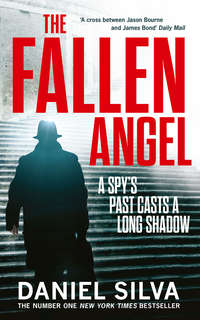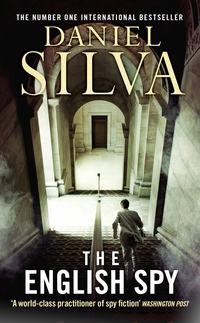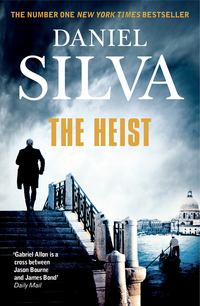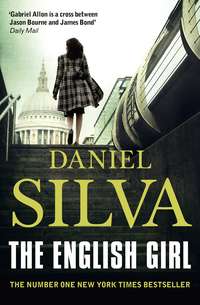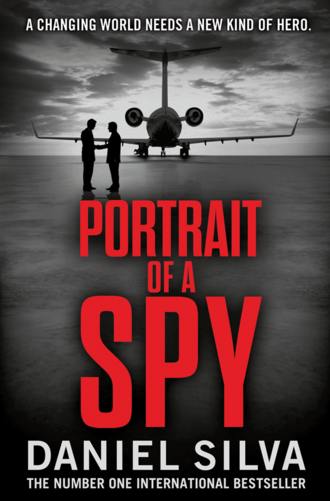
Полная версия
Portrait of a Spy
The auction was scheduled to begin at six. Francis Hunt, Christie’s chief auctioneer, granted his fidgety audience five additional minutes to find their seats before taking his place. He had polished manners and a droll English urbanity that for some inexplicable reason still made Americans feel inferior. In his right hand was the famous “black book” that held the secrets of the universe, at least as far as this evening was concerned. Each lot in the sale had its own page containing information such as the seller’s reserve, a seating chart showing the location of expected bidders, and Hunt’s strategy for extracting the highest possible price. Lovegrove’s name appeared on the page devoted to Lot 12, the Rothko. During a private presale viewing, Lovegrove had hinted he might be interested, but only if the price was right and the stars were in proper alignment. Hunt knew Lovegrove was lying, of course. Hunt knew everything.
He wished the audience a pleasant evening, then, with all the fanfare of a maître d’ summoning a party of four, said, “Lot One, the Twombly.” The bidding commenced immediately, moving swiftly upward in hundred-thousand-dollar increments. The auctioneer deftly managed the process with the help of two immaculately coiffed spotters who strutted and posed behind the rostrum like a pair of male models at a photo shoot. Lovegrove might have been impressed with the performance had he not known it was all carefully choreographed and rehearsed in advance. At one million five, the bidding stalled, only to be revived by a telephone bid for one million six. Five more bids followed in quick succession, at which point the bidding paused for a second time. “The bid is two point one million, with Cordelia on the telephone,” Hunt intoned, eyes moving seductively from bidder to bidder. “It’s not with you, madam. Nor with you, sir. Two point one, on the telephone, for the Twombly. Fair warning now. Last chance.” Down came the gavel with a sharp crack. “Thank you,” murmured Hunt as he recorded the transaction in his black book.
After the Twombly, it was the Lichtenstein, followed by the Basquiat, the Diebenkorn, the De Kooning, the Johns, the Pollock, and a parade of Warhols. Each work fetched more than the presale estimate and more than the previous lot. It was no accident; Hunt had cleverly stacked the deck to create an ascending scale of excitement. By the time Lot 12 slid onto the display case, he had the audience and the bidders exactly where he wanted them.
“On my right we have the Rothko,” he announced. “Shall we start the bidding at twelve million?”
It was two million above the presale estimate, a signal that Hunt expected the work to go big. Lovegrove drew a mobile phone from the breast pocket of his Brioni suit jacket and dialed a number in Paris. Hamdali answered. He had a voice like warm tea sweetened with honey.
“My client would like to get a sense of the room before making a first bid.”
“Wise move.”
Lovegrove placed the phone on his lap and folded his hands. It quickly became apparent they were in for a tough fight. Bids flew at Hunt from all corners of the room and from the Christie’s staff manning the telephones. Hector Candiotti, art adviser to a Belgian industrial magnate, was holding his paddle in the air like a crossing guard, a blusterous bidding technique known as steamrolling. Tony Berringer, who worked for a Russian aluminum oligarch, was bidding as though his life depended on it, which was not beyond the realm of possibility. Lovegrove waited until the price reached thirty million before picking up the phone again.
“Well?” he asked calmly.
“Not yet, Mr. Lovegrove.”
This time, Lovegrove kept the phone pressed to his ear. In Paris, Hamdali was speaking to someone in Arabic. Unfortunately, it was not one of the several languages Lovegrove spoke fluently. Biding his time, he surveyed the sky suites, searching for secret bidders. In one he noticed a beautiful young woman holding a mobile phone. After a few seconds, Lovegrove noticed something else. When Hamdali was speaking, the woman was sitting silently. And when the woman was speaking, Hamdali was saying nothing. It was probably a coincidence, he thought. But then again, maybe not.
“Perhaps it’s time to test the waters,” suggested Lovegrove, his eyes on the woman in the skybox.
“Perhaps you’re right,” answered Hamdali. “One moment, please.”
Hamdali murmured a few words in Arabic. A few seconds later, the woman in the skybox spoke into her mobile phone. Then, in English, Hamdali said, “The client agrees, Mr. Lovegrove. Please make your first bid.”
The current bid was thirty-four million. With the arch of a single eyebrow, Lovegrove raised it by another million.
“We have thirty-five,” said Hunt, in a tone that indicated a serious new predator had entered the fray. Hector Candiotti immediately countered, as did Tony Berringer. A pair of sparring telephone bidders pushed the price across the forty-million-dollar threshold. Then Jack Chambers, the real estate king, casually bid forty-one. Lovegrove wasn’t terribly worried about Jack. The affair with that little tart in New Jersey had cost him dearly in the divorce. Jack wasn’t liquid enough to go the distance.
“The bid is forty-one against you,” Lovegrove murmured into the telephone.
“The client believes there is a great deal of posturing going on.”
“It’s an art auction at Christie’s. Posturing is de rigueur.”
“Patience, Mr. Lovegrove.”
Lovegrove kept his eyes on the woman in the skybox as the bidding cracked the fifty-million-dollar threshold. Jack Chambers made a final bid at sixty; Tony Berringer and his Russian gangster did the honors at seventy. Hector Candiotti responded by waving the white flag.
“It looks like it’s down to us and the Russian,” Lovegrove said to the man in Paris.
“My client doesn’t care for Russians.”
“What would your client like to do about it?”
“What is Rothko’s record at auction?”
“Seventy-two and change.”
“Please bid seventy-five.”
“It’s too much. You’ll never—”
“Place the bid, Mr. Lovegrove.”
Lovegrove arched an eyebrow and raised five fingers. “The bid is seventy-five million,” said Hunt. “It’s not with you, sir. Nor with you. Seventy-five million, for the Rothko. Fair warning now. Last chance. All done?”
Crack.
A gasp rose in the room. Lovegrove looked up at the skybox, but the woman was gone.
Chapter 9
The Lizard Peninsula, Cornwall
WITH THE APPROVAL OF SCOTLAND YARD, the Home Office, and the British prime minister himself, Gabriel and Chiara returned to Cornwall three days after the bombing in Covent Garden. Madonna and Child with Mary Magdalene, oil on canvas, 110 by 92 centimeters, arrived at ten the following morning. After carefully removing the painting from its protective coffin, Gabriel placed it on an antique oak easel in the living room and spent the remainder of the afternoon studying the X-rays. The ghostly images only strengthened his opinion that the painting was indeed a Titian, and a very good Titian at that.
It had been several months since Gabriel had laid hands on a painting, and he was eager to begin work right away. Rising early the following morning, he prepared a bowl of café au lait and immediately threw himself into the delicate task of relining the canvas. The first step involved adhering tissue paper over the image to avoid further paint losses during the procedure. There were a number of over-the-counter glues suitable for the task, but Gabriel always preferred to mix his own adhesive using the recipe he had learned in Venice from the master restorer Umberto Conti—pellets of rabbit-skin glue dissolved in a mixture of water, vinegar, ox bile, and molasses.
He simmered the noxious-smelling concoction on the kitchen stove until it was the consistency of syrup, and watched the morning news on the BBC while waiting for the mixture to cool. Farid Khan was now a household name in the United Kingdom. Given the precise timing of his attack, Scotland Yard and British intelligence were operating under the assumption it was linked to the bombings in Paris and Copenhagen. Still unclear was the terrorist affiliation of the bombers. Debate among the television experts was intense, with one camp proclaiming the attacks were orchestrated by al-Qaeda’s old-line leadership in Pakistan and another declaring that they were clearly the work of a new network that had yet to produce a blip on the radar screens of Western intelligence. Whatever the case, European authorities were bracing for more bloodshed. MI5’s Joint Terrorism Analysis Center had raised the threat level to “critical,” meaning another attack was expected imminently.
Gabriel focused most intently on a report dealing with questions over Scotland Yard’s conduct in the minutes before the attack. In a carefully worded statement, the commissioner of the Metropolitan Police acknowledged receiving a warning about a suspicious man in an oversized coat headed toward Covent Garden. Regrettably, said the commissioner, the tip did not rise to the level of specificity required for lethal action. He then confirmed that two SO19 officers had been dispatched to Covent Garden but said they had no choice under existing policy but to hold their fire. As for reports of a weapon being drawn, police had questioned the man involved and determined it was not a gun but a camera. For reasons of privacy, the man’s identity would not be revealed. The press appeared to accept the Met’s version of events, as did the civil libertarians, who applauded the restraint shown by the police even if it had meant the loss of eighteen innocent lives.
Gabriel switched off the television as Chiara entered the kitchen. She immediately opened a window to drive out the stench of the ox bile and vinegar and berated Gabriel for fouling her favorite stainless steel saucepan. Gabriel only smiled and dipped the tip of his forefinger into the mixture. It was now cool enough to use. With Chiara peering over his shoulder, he applied the glue evenly over the yellowed varnish and adhered several rectangles of tissue paper to the surface. Titian’s handiwork was now invisible and would remain so for the next several days, until the relining was complete.
Gabriel could do no more work that morning except to check on the painting periodically to make certain the glue was drying properly. He sat in the covered gazebo overlooking the sea, a notebook computer on his lap, and scoured the Internet for more information about the three bombings. He was tempted to check in with King Saul Boulevard but thought better of it. He had neglected to inform Tel Aviv of his brush with terror in Covent Garden, and to do so now would only give his former colleagues an excuse to intrude on his life. Gabriel had learned from experience it was best to treat the Office like a jilted lover. Contact had to be kept to a minimum and was best conducted in public places where a messy scene would be inappropriate.
Shortly before noon, the last remnants of a midnight gale passed over Gunwalloe Cove, leaving in its wake a clear sky of crystalline blue. After making one final check of the painting, Gabriel pulled on an anorak and a pair of hiking boots and headed out for his daily march along the cliffs. The previous afternoon he had trooped north along the Coastal Path to Praa Sands. Now he mounted the small rise behind the cottage and headed south toward Lizard Point.
It did not take long for the magic of the Cornish coast to chase away the memories of the dead and wounded in Covent Garden. Indeed, by the time Gabriel had reached the fringes of Mullion Golf Club, the last terrible image was safely concealed beneath a layer of obliterating paint. As he pressed farther south, past the rocky outcropping of the Polurrian Cliffs, he thought only of the work to be done on the Titian. Tomorrow he would carefully remove the painting from its stretcher and then adhere the weakened canvas to a swath of fresh Italian linen, pressing it firmly into place with a heavy tailoring iron. Next came the longest and most arduous phase of the restoration—removing the cracked and yellowed varnish and retouching those portions of the painting lost to time and stress. While some restorers tended to be aggressive in their retouching, Gabriel was known throughout the art world for the lightness of his touch and his uncanny ability to mimic the brushstrokes of the Old Masters. He believed it was the duty of a restorer to come and go without being seen, leaving no evidence of his presence other than a painting returned to its original glory.
By the time Gabriel reached the northern end of Kynance Cove, a line of dark clouds had obscured the sun, and the sea wind had turned markedly colder. A keen observer of Cornwall’s capricious weather, he could see that the “bright interval,” as British meteorologists liked to call periods of sunshine, was about to come to an abrupt end. He paused for a moment, debating where to take shelter. To the east, across a patchwork-quilt landscape, was Lizard village. Directly ahead was the point. Gabriel chose the second option. He didn’t want to shorten his walk over something as trivial as a passing squall. Besides, there was a good café atop the cliffs where he could wait out the storm over a freshly baked scone and a pot of tea.
He turned up the collar of his anorak and headed along the rim of the cove as the first rain began to fall. The café appeared, veiled in mist. At the base of the cliffs, sheltering against the leeward side of the derelict boathouse, was a man in his mid-twenties with short hair and sunglasses propped on his head. A second man was loitering atop the observation point, his eye pressed to a coin-operated telescope. Gabriel knew with certainty it had been inoperative for months.
He slowed to a stop and looked toward the café just as a third man stepped onto the terrace. He wore a waterproof hat pulled close to his brow and a pair of rimless eyeglasses favored by German intellectuals and Swiss bankers. His expression was one of impatience—a busy executive who had been forced by his wife to take a holiday. He stared directly at Gabriel for a long moment before lifting his thick wrist toward his face and consulting his watch. Gabriel was tempted to turn in the opposite direction. Instead, he lowered his gaze to the footpath and walked on. Better to do it in public, he thought. It would reduce the chances of a messy scene.
Chapter 10
Lizard Point, Cornwall
DID YOU REALLY HAVE TO order scones?” asked Uzi Navot resentfully.
“They’re the best in Cornwall. So is the clotted cream.”
Navot made no movement. Gabriel gave a perceptive smile.
“How much more weight does Bella want you to lose?”
“Five pounds. Then I get to go on maintenance,” Navot added gloomily, as though it were a prison sentence. “What I wouldn’t give for your metabolism. You’re married to one of the world’s greatest cooks, but you still have the body of a twenty-five-year-old. Me? I’m married to one of the country’s foremost experts on Syria, and if I even smell a pastry, I have to let my trousers out.”
“Maybe it’s time you told Bella to lighten up on the dietary restrictions.”
“You tell her,” Navot said. “All those years studying the Baathists in Damascus have left a mark on her. Sometimes I feel as though I’m living in a police state.”
They were seated at an isolated table near the rain-spattered windows. Gabriel was facing the interior; Navot, the sea. He was wearing a pair of corduroy trousers and a beige sweater that still smelled of the men’s department at Harrods. He placed his cap on an adjacent chair and ran a hand over his cropped strawberry-blond hair. It had a bit more gray in it than Gabriel remembered, but that was understandable. Uzi Navot was now the chief of Israel’s secret intelligence service. Gray hair was one of the many fringe benefits of the job.
Were Navot’s brief tenure to end now, it would almost certainly be regarded as among the most successful directorships in the long and storied history of the Office. The accolades that had been bestowed upon him were the result of Operation Masterpiece, the joint Anglo-American-Israeli undertaking that had resulted in the destruction of four secret Iranian nuclear facilities. Much of the credit rightly belonged to Gabriel, though Navot preferred not to dwell on that aspect of the affair. He had been awarded the job as chief only because Gabriel had repeatedly turned it down. And the four enrichment facilities would still be spinning away if Gabriel hadn’t identified and recruited the Swiss businessman who was covertly selling component parts to the Iranians.
For the moment, however, Navot’s thoughts seemed focused only on the plate of scones. Unable to resist any longer, he selected one, split it with great care, and smothered it with strawberry preserves and a dollop of the clotted cream. Gabriel poured himself a cup of tea from an aluminum pot and quietly asked about the purpose of Navot’s unannounced visit. He did so in fluent German, which he spoke with the Berlin accent of his mother. It was one of five languages he and Navot had in common.
“I had a number of housekeeping issues to discuss with my British counterparts. Included on the agenda was a somewhat perplexing report about one of our former agents who’s now living in retirement here under MI5 protection. There was a wild rumor going around about this agent and the bombing in Covent Garden. To be honest, I was a bit dubious when I heard it. Knowing this agent well, I couldn’t imagine that he would endanger his position in Britain by doing something so foolish as drawing his weapon in public.”
“What should I have done, Uzi?”
“You should have called your MI5 minder and washed your hands of it.”
“And if you had found yourself in a similar position?”
“If I were in Jerusalem or Tel Aviv, I wouldn’t have hesitated to put the bastard down. But here . . .” Navot’s voice trailed off. “I suppose I would have considered the potential consequences of my actions first.”
“Eighteen people died, Uzi.”
“Consider yourself lucky the death toll wasn’t nineteen.” Navot removed his spindly eyeglasses, something he often did before embarking on an unpleasant conversation. “I’m tempted to ask whether you actually intended to take the shot. But given your training and your past exploits, I’m afraid I know the answer. An Office agent draws his weapon in the field for one reason and one reason only. He doesn’t wave it around like a gangster or make idle threats. He pulls the trigger and shoots to kill.” Navot paused, then added, “Do unto others before they have a chance to do unto you. I believe those words can be found on page twelve of Shamron’s little red book.”
“He knows about Covent Garden?”
“You know better than to ask a question like that. Shamron knows everything. In fact, I wouldn’t be surprised if he heard about your little adventure before I did. Despite my attempts to ease him into permanent retirement, he insists on staying in contact with his sources from the old days.”
Gabriel added a few drops of milk to his tea and stirred it slowly. Shamron . . . The name was nearly synonymous with the history of Israel and its intelligence services. After fighting in the war that led to Israel’s reconstitution, Ari Shamron had spent the subsequent sixty years protecting the country from a host of enemies bent on its destruction. He had penetrated the courts of kings, stolen the secrets of tyrants, and killed countless foes, sometimes with his own hands, sometimes with the hands of men such as Gabriel. Only one secret had eluded Shamron—the secret of contentment. Aged now and in dreadful health, he clung desperately to his role as the éminence grise of Israel’s security establishment and still meddled in the internal affairs of the Office as though it were his private fiefdom. It was not arrogance that drove Shamron but a nagging fear that his entire life’s work had been in vain. Though economically prosperous and militarily strong, Israel remained surrounded by a world that was, for the most part, hostile to its very existence. The fact that Gabriel had chosen to reside in this world was among Shamron’s greatest disappointments.
“I’m surprised he didn’t come here himself,” Gabriel said.
“He was tempted.”
“Why didn’t he?”
“It’s not so easy for him to travel.”
“What’s wrong now?”
“Everything,” Navot said, shrugging his heavy shoulders. “He rarely leaves Tiberias these days. He just sits on his terrace staring out at the lake. He’s driving Gilah to distraction. She’s been begging me to give him something to do.”
“Should I go see him?”
“He’s not on his deathbed, if that’s what you’re implying. But you should pay a visit sometime soon. Who knows? You might actually decide that you like your country again.”
“I love my country, Uzi.”
“Just not enough to live there.”
“You always did remind me a bit of Shamron,” Gabriel said with a frown, “but now the resemblance is uncanny.”
“Gilah told me the same thing not long ago.”
“I didn’t mean it as a compliment.”
“Neither did she.” Navot added another spoonful of clotted cream to his scone with exaggerated care.
“So why are you here, Uzi?”
“I want to present you with a unique opportunity.”
“You sound like a salesman.”
“I’m a spy,” Navot said. “There’s not much of a difference.”
“What are you offering?”
“A chance to atone for a mistake.”
“What mistake was that?”
“You should have shot Farid Khan through the back of the head before he hit his detonator switch.” Navot lowered his voice and added confidingly, “That’s what I would have done, if I’d been in your shoes.”
“And how might I make amends for this lapse in judgment?”
“By accepting an invitation.”
“From whom?”
Navot gazed silently westward.
“The Americans?” asked Gabriel.
Navot smiled. “More tea?”
The rain ceased as abruptly as it began. Gabriel left money on the table and led Navot down the steep footpath to Polpeor Cove. The bodyguard was still leaning against the crumbled lifeboat ramp. He watched with feigned indifference as Gabriel and Navot made their way slowly across the rocky beach to the water’s edge. Navot cast a distracted glance at his stainless steel wristwatch and turned up his coat collar against the gusty wind rising from the sea. Gabriel was once again struck by the uncanny resemblance to Shamron. The likeness went beyond the superficial. It was as if Shamron, by the sheer force of his indomitable will, had somehow managed to take possession of Navot, body and soul. It was not the Shamron who had been weakened by age and infirmity, thought Gabriel, but Shamron in his prime. All that was missing were the wretched Turkish cigarettes that had ravaged Shamron’s health. Bella had never permitted Navot to smoke, not even for the sake of his cover.
“Who’s behind the bombings, Uzi?”
“Thus far, we’ve been unable to make a firm attribution. The Americans, however, seem to think he’s the future face of global jihadist terror—the new Bin Laden.”
“Does this new Bin Laden have a name?”
“The Americans insist on sharing that information with you face-to-face. They’d like you to come to Washington, all expenses paid, of course.”
“How was this invitation extended?”
“Adrian Carter called me personally.”
Adrian Carter was the director of the CIA’s National Clandestine Service.
“What’s the dress code?”
“Black,” said Navot. “Your visit to America will be entirely off the books.”
Gabriel regarded Navot in silence for a moment. “You obviously want me to go, Uzi. You wouldn’t be here otherwise.”
“It couldn’t hurt,” Navot said. “At the very least, it will give us an opportunity to hear what the Americans have to say about the bombings. But there are other fringe benefits as well.”
“Such as?”
“Our relationship could use a bit of retouching.”
“What sort of retouching?”
“Haven’t you heard? There’s a new wind blowing through Washington. Change is in the air,” Navot added sarcastically. “The new American president is an idealist. He believes he can repair relations between the West and Islam, and he’s convinced himself that we’re part of the problem.”






